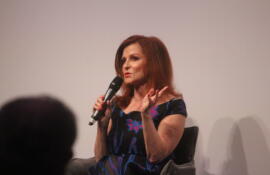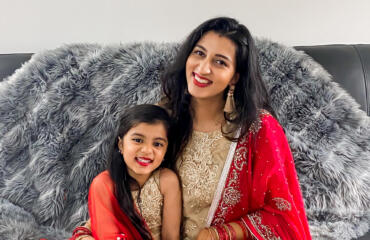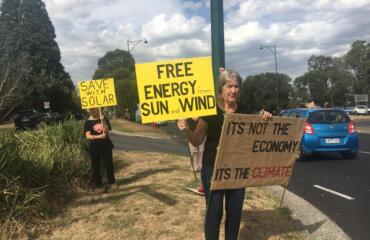When reporters bowl up questions to politicians and candidates, what’s the difference between a “gotcha” set-up and a legitimate, hard-ball inquiry?
In the frenzy of the federal election campaign, discussion about where the line falls has preoccupied not just social media’s political twitterati, but provoked reflection by reporters and their editors, a public editors’ forum convened by the University of Melbourne’s Centre for Advancing Journalism revealed this week.
The Age’s editor Gay Alcorn acknowledged widespread public criticism of so-called “gotcha” questions, and she allowed it can “seem like the journalists sometimes want to become the story”. But, she said – and others on the panel agreed – the early, and now infamous question to Labor leader Anthony Albanese about the unemployment rate was legitimate.

“I would really like to see more political discourse,” said The Conversation’s Misha Ketchell, left, with moderator Andrew Dodd (centre) and News Corp’s James Campbell.
While the tactic could be tedious, politicians’ answers to these direct questions can sometimes be revealing, Alcorn said. Like in 1993 when then opposition leader John Hewson was famously unable to answer a question about GST on a birthday cake.
“What it revealed was it was an incredibly complicated policy that he was that he was putting forward… it was actually a telling moment.”
“It’s very hard to get straight answers out of politicians these days”, argued Tom Zaunmayr, editor of the National Indigenous Times. He said the “gotcha” style of questioning could sometimes emerge due to frustration with politicians not answering questions, not taking calls or only providing generic statements from paid media advisors.
Later, moderator Associate Professor Andrew Dodd, director of the Centre for Advancing Journalism, joined in with his own gotcha for James Campbell, News Corp’s political editor, waving a copy of the May 1 edition of the Herald Sun, featuring a cover story which had drawn wide criticism on social media.
“I want to ask you about a couple of covers that have run in recent newspapers, including one on the first of May where you profiled [Federal Treasurer] Josh Frydenberg in Kooyong with an extraordinary front-page cover – ‘Fight of my life’, double-page spread.”
Dodd described it as “basically a hagiography or an apologia for Frydenberg”.
But Campbell backed his story. ”It wasn’t a profile of the seat of Kooyong, it was an interview with the Treasurer about how he was going in his battle to hold his seat.”
“It’s about choices, right? It’s about what you think the most newsworthy, and the most important angle is. On that occasion, an exclusive interview with the Treasurer, in which he said for the first time, ‘I think I’m in danger of losing’.
“How is that not a front-page story?”
The editor of The Conversation, Misha Ketchell, said he had naïvely hoped that “this election campaign could be a discussion about policy about the challenges we face as a country and what we might do next”.
But instead, it’s confirmed that an election campaign is probably the worst time for a conversation about policy.
“All of the political players have a vested interest in only talking about topics on which they think they have a political advantage, a tactical advantage that will help them get elected … So what happens is, you get this very narrow, performative sort of political discourse.”
And performance was not limited to the politicians, Campbell acknowledged, with reporters and editors understanding that getting their names and questions explicitly recognised in the audio grabs bolstered their own brands and credentials, creating “an exclusive bit of content out of a press conference”.
Ensuring political conversations were pushed outside the boundaries where campaign strategists wanted to contain them was the media’s job, Alcorn said. “Our job is to not just be narrowly focused on what the narrow agenda that the political parties want us to focus on.”
She said in addition to its in depth seat coverage of Goldstein, Kooyong and Chisholm, The Age planned more proactive coverage in the final days of the campaign on the National Disability Insurance Scheme and education policy.
Lenore Taylor, editor of Guardian Australia, said her newsroom had set out to focus on issues like the NDIS. She said The Guardian had also “tried very hard to get the discussion onto not just housing costs, but the rental crisis.
“A third of Australians rent their homes, rents have gone up by over 30 percent, particularly in regional areas, but also in urban areas. And it’s you know, it’s a massive part of the cost-of-living crisis.
“And the parties don’t really want to talk about it that much.”
Zaunmayr said the National Indigenous Times had covered high profile issues for First Australians like the referendum on the Voice to Parliament and the Makarrata Commission, as well as covering “the same kind of issues that wider Australia faces, albeit from a different lens”.
In a long list of policy issues not being adequately addressed by the major parties, Zaunmayr included areas like overcrowded housing, youth justice, deaths in custody, Native Title and the ways mining companies work alongside Traditional Owners in the Pilbara.

Moderator Andrew Dodd questioned News Corp’s James Campbell on his front page Herald Sun profile of Federal Treasurer Josh Frydenberg, describing it as “basically a hagiography”. Campbell defended the story, which he described as an exclusive interview in which the Treasurer said for the first time he was in danger of losing. “How is that not a front-page story?”
An audience member asked whether there should be an American style debate commission to avoid the “argy bargy” between the parties and TV networks around debates.
The last minute scramble around scheduling debates leads to suboptimal outcomes, Taylor said, and “we had one of those”, referring to the debate on May 8 hosted by Nine, where Prime Minister Scott Morrison and Opposition Leader Anthony Albanese talked over one another.
“It would be vastly better to have a more orderly process that was kind of fair to all media organisations. And I agree it would be good to see the national broadcaster get a look in,” she said.
Campbell argued debates weren’t a priority. He’d earlier emphasised that while there was plenty of preoccupation with the concerns of political “superfans”, there was also a large segment of the public audience which is totally disengaged from politics.
“I can’t think of a single election that has turned on one of these things in Australian history.”
Ketchell put forward an idea which he said would likely be “both unpopular and impractical. But I really would love to see more speeches in public political discourse. I feel like there was a time in our politics, when the idea of a politician giving a set piece speech was the real test where you got a sense of their character, of the way they talk and the way they think.”
So in terms of the debates, he added, “I’d like to see a format that actually also gave them an opportunity to really talk in a candid way about the policy issues that are on their mind and get a sense of how they think.”
A recording of this forum will be broadcast on ABC Radio National’s ‘Big Ideas’ program later this week. Stay tuned here.




